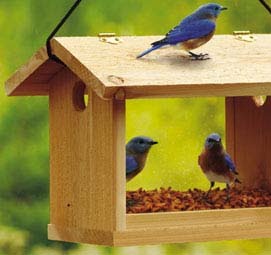Bluebirds do not use feeders naturally. However, they can be trained to eat from a bird feeder with a few simple steps.
Bluebird’s Natural Diet
Bluebirds forage for insects and fruits as the main sources of food in their diets. They prefer small berries and spiders or worms primarily.
Training Bluebirds to use a feeder
 Bluebird feeders that feature elements of their natural diet will be the easiest to attract a Bluebird to. Raisins, nut meats, mealworms and suet are all possible dietary supplements to use.
Bluebird feeders that feature elements of their natural diet will be the easiest to attract a Bluebird to. Raisins, nut meats, mealworms and suet are all possible dietary supplements to use.
Bluebirds are most likely to use a bird feeder if it is near their nesting box. By keeping an easy source of food nearby, birds will spend less time foraging and more energy building a nest and caring for their young.
Feeders are most likely to be used if placed in a highly visible area. Look for a location that is in an area your Bluebirds already frequent to find food. Although keeping the feeder near nesting boxes is recommended, make sure it isn’t too close, as it can attract predators. 200 yards or so away is a good distance.
Keeping a small tray of food underneath or near the feeder while the Bluebird is learning to use it helps to “train” the birds to use their new enclosed feeder.
Careful use of bird feeders
Feeders for Bluebirds are specifically designed to make it harder for other species of birds to reach the food. Birds the same size, or smaller than Bluebirds may potentially reach food, but Bluebird feeders will always be enclosed–usually by plastic panels–with small entrance holes.
With careful placement and consideration, Bluebird feeders can help attract these vibrant little songbirds to your yard for years to come!


